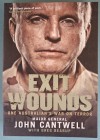Exit Wounds: One Australian’s War on Terror
Written by: Major General John Cantwell (Retd) with Greg Bearup,
Melbourne University Press, Melbourne, 2012,
ISBN: 9780522861785, 374 pp
Reviewed by: Dr John Blaxland, Senior Fellow, Strategic and Defence Studies Centre
Wow! This book is hard to put down. At first I was a bit reluctant to purchase a copy, assuming from the cover that the book was a little self-indulgent. After all, Major General John Cantwell had a dream career and one that many others envied. So why did he write what was ostensibly a ‘poor me’ story? Well, my preconceived ideas were quickly displaced by a gripping and captivating account brimming with stories covering the full range of emotions from excitement to anger to elation, to despair and to love. Cantwell pulls no punches in revealing his inner thoughts and fears and in describing his many trials and tribulations.
John Cantwell begins his account by describing his manoeuvering to be included in the contingent deploying to the Gulf War in 1990–1991, following this with a number of important insights into his experience in Iraq in 2006 and in Afghanistan in 2010. He explains his personal motives and the cost he was imposing on his family. He speaks of the visceral fear of being targeted by an Apache helicopter while in no man’s land in Iraq in the middle of a battle, and of the sight of dismembered and disfigured enemy remains. These are memories that would haunt and torment him for over two decades.
In the absence of a detailed and open account of Australia’s military involvement in the wars of Iraq and Afghanistan, this book provides some important and useful insights into a significant chapter in Australia’s military history. It is telling, though, that no official historian has yet been appointed to write the history of Australia’s involvement in these conflicts. In the meantime, the records of the time are being haphazardly maintained, with little thought to their preservation so as to allow an accurate and balanced account eventually to be written of these events — one that doesn’t rely solely on oral interviews with participants.
Yet this book’s significance lies beyond simply providing an important adjunct to the historical picture. It is significant in that it places the issue of post traumatic stress disorder (PTSD) firmly in the central spotlight for Defence planners, managers and commanders and for the Australian community as a whole.
The fact that John Cantwell — a major general — could write this account continues to be of enormous assistance to those affected by PTSD both directly and indirectly. At last someone of high rank has publicly described his personal battle in an attempt to demystify the condition. This ground-breaking book has opened the door for people who are hurting to deal with the pain and the consequences of this disorder. We all owe Major General John Cantwell a debt of gratitude for having the courage and temerity to write this book (and, to Melbourne University Press and Greg Bearup, hearty congratulations for having believed in the project and having backed it so well).
This book changes the ground rules for the Australian Defence Force and, in particular, the Australian Amy. The change should be welcomed. Soldiers and commanders should read this and reflect on their own circumstances and on those of the men and women for whom they are responsible.
The title Exit Wounds aptly captures the scale of the issue Cantwell addresses and he explains this in terms of the ballistic effect of a round entering and exiting a body. The psychological dimension has, for too long, been ‘patched over’ without detailed consideration or rehabilitation. With a major general making such a significant public admission, there is hope that the stigma will now be lifted and those with PTSD will be able to reach out, seek help and manage their condition. The rest of us also are now better placed to help and understand. To General Cantwell I say, ‘thank you’.


